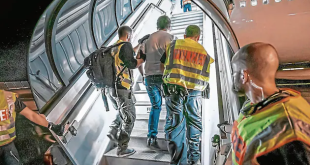AT Monitoring Desk-KABUL: The Special Inspector General for Afghanistan Reconstruction (SIGAR) on Friday released a review of the management and oversight of fuel in Afghanistan and found that fuel theft has become a lucrative business in the country.
According to SIGAR, due to the amount of fuel needed for military operations, along with the highly transferable nature of this commodity, fuel theft has become a lucrative business in Afghanistan, with at least $154.4 million USD in fuel stolen from either the US military or the Afghan National Defense and Security Forces.
“However, because US officials have usually detected fuel theft long after the theft began, it is likely that even more fuel has been stolen in Afghanistan,” the SIGAR report read.
SIGAR stated fuel theft and other means of profiting from fuel conspiracies can provide insurgent and terrorist organizations with needed funds to continue to undermine the Afghan government and threaten the Afghan people.
The review stated that the US Department of Defense (DoD) supplied more than 2.8 billion gallons of fuel to support US military operations in Afghanistan at a cost of more than $13 billion USD from the 2008 to 2016 financial years.
From 2010 through to 2018, DOD planned to spend $3.2 billion USD to supply fuel for the ANDSF.
According to the review, the DOD’s Combined Security Transition Command–Afghanistan (CSTC-A) is exploring new options to supply fuel going forward.
“Although these requirements may address some of the weaknesses associated with the ANDSF fuel procurement process, CSTC-A still has no ability to remotely monitor fuel deliveries, storage tank levels, or fuel transfer procedures,” the review stated.
“CSTC-A has not considered using technology-based capabilities to oversee fuel deliveries. In contrast, NATO’s Support and Procurement Agency (NSPA) and the Expeditionary Contracting Command–Afghanistan (ECC-A) awarded contracts to deliver fuel in Afghanistan that incorporated various remote monitoring methods into their fuel delivery processes.
“NSPA and ECC-A contracts have integrated technology to provide visibility of shipments in-transit into their delivery systems, and NSPA has also developed a fuel management system that has the ability to record transactions digitally, remotely monitor fuel inventories through remote metering, and remotely detect when fuel has been tampered with. According to a NSPA official, this led to a 30 percent reduction in reported fuel use, but no corresponding decrease in operations.”
However, one NSPA official told SIGAR that all NATO member countries, including the United States, are able to use portions of the technology the agency developed to support their own fuel accountability efforts.
SIGAR states the CSTC-A did not verify the quantity or quality of fuel delivered to the Afghan Army.
“CSTC-A informed us that they did not have detailed knowledge of ANDSF fuel site locations, the fuel storage capacities at those sites, or the infrastructure and personnel capabilities at the sites that would allow CSTC-A to be confident that the fuel is being managed properly,” the review stated.
According to SIGAR, the CSTC-A did not base its fuel orders for the ANDSF on consumption data. “Use of accurate consumption data could have provided less opportunity for excess fuel to be stolen or wasted,” SIGAR said.
“CSTC-A relied both on the vendors’ delivery data to determine amounts of fuel delivered, and on the Afghan government’s documentation, which the command suspected were fraudulent and inaccurate, to perform its oversight,” the review read.
SIGAR went on to state that current contracts to supply fuel to the ANDSF do not require outfitting fuel delivery trucks or destination storage tanks with sensors to facilitate remote monitoring of the fuel, despite other organizations, such as NSPA, using similar technology in their own fuel delivery operations.
Meanwhile, according to SIGAR, the CSTC-A relied on contractors to develop anticorruption plans themselves, and on contractors’ employees to actively report acts of corruption or attempts to otherwise divert fuel that they witness.
SIGAR stated that as of March 2017, the DOD estimated that the ANDSF would require approximately 108 million gallons of fuel annually.
But as CSTC-A moves forward with designing a long-term plan to supply fuel to the ANDSF that could cost nearly $2 billion USD, SIGAR noted that it is critical for the command to ensure that effective controls are in place to deter fuel theft and mitigate opportunities for corruption.
SIGAR has so far conducted 70 investigations related to fuel theft in Afghanistan, resulting in almost $32 million USD in fines, restitutions, and forfeitures, and $28.5 million USD in recoveries and savings.
The investigations have also led to 40 convictions that included sentences totaling more than 115 years in prison and 53 years of probation and resulted in authorities barring 176 individuals from military installations.
 Afghanistan Times
Afghanistan Times




